#The Weavers
Explore tagged Tumblr posts
Text
“You want me to name communists? Okay well Pete Seeger for one,” says Burl Ives when asked for his lunch order.
#burl ives#the weavers#pete seeger#folk music#folk#1960s#1950s#I got a biggggg bone to pick with burl ives#communism#socialism#red scare#the red scare#mccarthyism
35 notes
·
View notes
Text
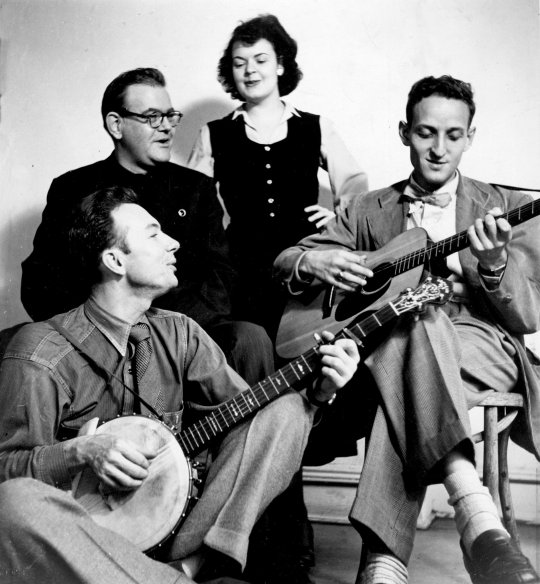
I love them so much and this picture ugh it's so beautiful
10 notes
·
View notes
Text
Song of the day
do you want to know the history of a folk song? submit an ask or dm me and I'll cover it
youtube
"Irene (Goodnight, Irene)"
Lead Belly, 1933
this song was covered by many artists, but my favorite is the most notable cover: this one by the Weavers
The Weavers' version is incredibly important to the history of folk music, as it was their most popular song in 1948 (and the first no. charting single in the folk music genre), and helped kick them off into popularity before they were blacklisted just 2 years later.
#lead belly#blues#blues history#huddie ledbetter#the weavers#american folk revival#folk revival#american folk#folk#american history#history#black history#music history#black folk#song of the day
9 notes
·
View notes
Text
Wasn't That a Time - The Weavers
youtube
Written by Lee Hays and Walter Lowenfels, "Wasn't That a Time," while not one of The Weavers' hits and most played songs, was one of their most overtly political. Built around the analogy that those who fought at Valley Forge during the American Revolution and at Gettysburg during the Civil War as a battle for community, unity, and brotherhood against forces attempting to divide people against each other, the song related those troubles to those of the American worker and laborer being pitted against each other by capitalist owners and oligarchs. Three of the members of The Weavers--Lee Hays, Pete Seeger, and Fred Hellerman--were brought in for questioning by HUAC (the House Un-American Committee), which hit a peak during the 1950s, but began in the post-WWII period in earnest, suppressing and oppressing peoples' beliefs and ability for free association. During questioning by the committee, both Seeger and Hays were asked specifically about performing this song. The chorus repeats the title of the song, ending with "A time to try the soul of man/Wasn't that a terrible time," which can be read two ways: one: that the time during the war was a terrible time because people who are supposed to be united were fighting against each other, fighting against their own countrymen, and--especially in the case of the Civil War where the South was fighting for their rights to continue the practice of slavery and ownership of other people, instead of seeing people as equal in dignity and purpose--for what reason. Or two, a more sarcastic/satirical reading: where people banding together in common cause to maintain a union and ensure dignity for all people was such a terrible thing to be fighting for. Either interpretation conveys the same message: the only change being the tone of the messenger. The second verse encapsulates the righteousness of fighting for community and unity as a people:
Brave men who fought at Gettysburg Now lie in soldiers' graves But there they stemmed the rebel tide And there this land was saved
The song's lyrics were changed frequently over time, even by Hays and other members of The Weavers. Verse 3, for instance, begins with "The madmen came with chains of war" a line which had originally been written as "The fascists came with chains of war."
Verse 4 in all versions refers to the same oppressive forces as madmen, however, instead of fascists (but the implication that it's the same people is clear), by changing the chorus and the verse to the present time instead of the past:
[Verse 4] And now again those madmen come And shall our victory fail There is no victory in a land Where free men go to jail [Chorus] Isn't this a time? (Isn't this a time?) Isn't this a time? A time to try the soul of man Isn't this a terrible time? (Isn't this a terrible time?)
The fifth verse has changed lyrics a few times as well. The version posted above states: "Our faith cries out we have no fear/ We dare to reach our hand/ To other neighbors far and near/ To friends in every land." But in other versions, The Weavers showed solidarity with international antifascist movements, specifically the rebel side during the Spanish Civil War, by adopting their slogan No pasarán:
Our faith cries out, "This shall not pass" We cry, "No pasarán" We pledge our lives, our honor all To free this prison land

No pasarán was used by the International Brigades (brigadiers) during the Spanish Civil War as an antifascist rallying and unifying cry, and by one of the leaders of the Communist Party of Spain during a famous speech in their war against fascist dictator General Francisco Franco, who had backing from Hitler and Mussolini. The phrase has also been used as a rallying cry starting in 2022 for support for Ukraine. It is a phrase regularly used in antifascist solidarity, along with the song "Bella Ciao," which will be the subject of a future TSKF entry.
(Bella Ciao was originally written as a song in solidarity with laborers and evolved to become an antifascist and authoritarian anthem. Completely unlike "Wasn't That a Time" or any other song by The Weavers. Funny how labor rights and antifascism are on the same side, or how anti-labor/anti-worker and authoritarianism are frequently linked ideologies, and go hand in hand. So weird.)

During The Weavers' reunion in 1980, Lee Hays, by this point in a wheelchair due to his diabetes, added a couple of verses to the song:
How many times we've gone to kill In freedom's holy name And children died to save the pride Of rulers without shame Informers took their Judas pay To tell their sorry tale And gangs in Congress had their way And free souls went to jail
This was approximately thirty-five years after he had written the song, and the same damaged and destructive ideologies they had been fighting against then were still relevant; these battles and class wars were still being fought.
And now, forty-five years after that reunion, and 80 years after the song was written, it's still relevant. We're still fighting for solidarity, community, and against fascists in our own country.
#pete seeger#the weavers#lee hays#folk music#fred hellerman#ronnie gilbert#wasn't that a time#these songs kill fascists#protest songs#protest music#antifascist#eat the rich#labor rights#bella ciao#class consciousness#class solidarity#class war
2 notes
·
View notes
Text
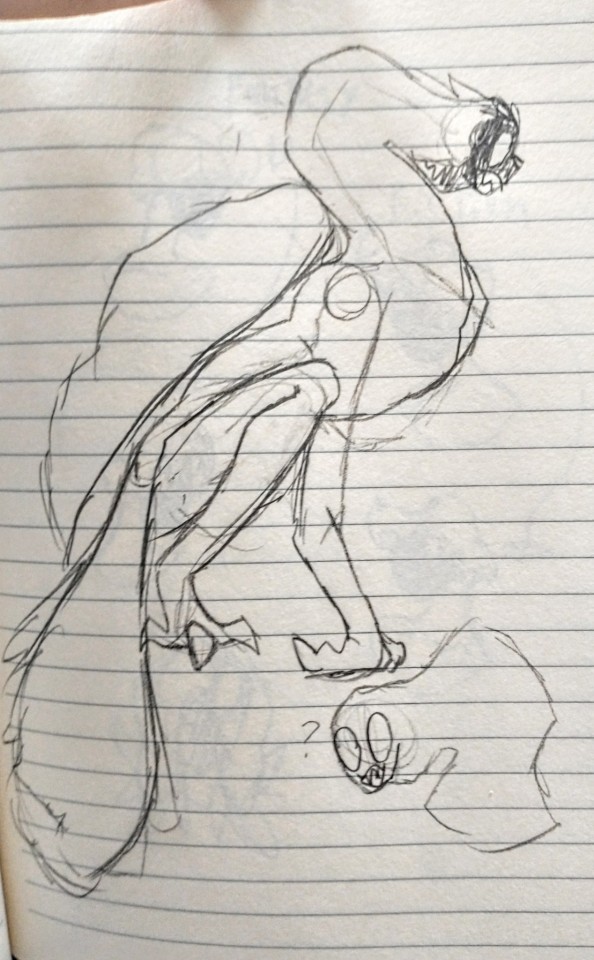
This is one of weavers forms, you just have to guess what it's supposed to be
7 notes
·
View notes
Text
The Weavers
heehoo here goes my original wip i've mentioned a couple times. i know posting original fiction on tumblr is like screaming into a well but better try and fail than not try at all, right?
Genre: dark fantasy Description: Humans and alves have been waging wars since time immemorial. Peace seems impossible, since the two species can't even communicate with each other. But things may change after a human and an alv discover they have an inexplicable connection and try to turn around their common curse.
Ch. 1
It was cold that was driving him insane most of all. Radiated by the rods of his cage that never warmed from the heat of his body, it seeped through his skin, nestled in his bones, slowed his heartbeat and froze his very thoughts, turning them slow, fragmentary, incoherent. The sunlight reaching his skin never did more than slightly warm the surface, thought there wasn’t much sunlight at all here, the sky more often than not obscured by clouds – bad sign, he would think before, but it was for naught now: it couldn’t get any worse anyway. He never thought himself much affected by cold; turned out, he just didn’t know what real cold was, protected by mighty trunks of his home forest from the vicious gusts of wind and the chilly breath of the night. The humans dragging him around wore furs and lit fires, and sometimes the wind brought a whiff of heat they emanated, and fearsome as they were, he could almost understand why they would try to tame such a destructive force. He knew humans were plenty, but to breed so much they pushed out some of their own kin into the most inhospitable lands on the very edge of Laia Serra… He would even feel sorry for them if they hadn’t put him in the cage.
It was so small he couldn’t stretch his legs and so narrow he couldn’t flex his arms, and his body was losing its agility and strength, sucked out by the cold and the ever-consuming grey of the sky. Some nights he feared he would lose his fingers and toes, and when he breathed on them to warm them up, his breath came out chilly, as if his insides had already frozen up. Relief came sometimes in the form of the humans’ repulsive broth, where soft, soggy vegetables and grey, hardened meat swam around in oily water, but it was oh so warming and filling and did a good job quenching his thirst. He even swallowed some of the disgusting vegetables occasionally – one couldn’t survive on just liquid.
But as days passed and an all-consuming apathy set in, he found it harder and harder. His body was rotting alive. The skin under his nails turned a brownish, sicklish color, the corners of his lips chipped and bled. The bruises on his chest where the humans slammed him with a heavy metal weapon throbbed with dumb pain at every breath he took as his ribs shifted underneath, bulging unnaturally under the skin. The bracelets on his wrists burned his skin at first, so bad he couldn’t hold back tears, but now the pain dulled down – or the skin on his wrists was growing senseless, any of which was fine by him. It’s not like he had much left to live anyway.
He spent the entirety of his days in a trance, barely noticing what was happening around him. Occasionally a horse’s neigh reached his ears, and he never had much empathy for animals, but the poor creatures sounded almost as pained as he felt. He tried to reach them, but where once was a pulsing presence now was nothing. Neither could he feel the lizards and rabbits hurrying past, like an invisible wall separated them; neither could he feel the blades of grass piercing the earth, flowers blooming or bugs scurrying between them. Sometimes birds flew over his cage, landed on nearby cliffs, inevitably attracted but too afraid to land. They did not answer his calls, but at least acknowledged his presence. It was reassuring, in a sense; he was inside his body still, even though he sometimes felt so detached from it he could almost see himself from the side, plastered on the bottom of his cage, weak and pathetic. The best representative of his kin there could ever be, he smiled bitterly sometimes.
The Neiro was silent. Everything was silent. Except the humans, constantly chattering and gibbering in their harsh, loud voices, grating on his ears. Didn’t they want to shut up just for a second? To hear the rustling of the wind, the howling of the wolves, the flapping of birds’ wings? Was it that constant gibberish that drove them to violence? He wouldn’t be surprised much, as even what he heard from the distance of his cage was driving him insane. Humans avoided him like alves did wildfire, always approaching carefully, with blades bared; the one pushing the plate with the broth through the bars of his cage always prodded his weapon at him, scaring him away from the bars. Not that he ever tried to so much as wave his hand at them, but even him baring his teeth scared them to bits, causing another explosion of gibberish and screams.
At some point, he couldn’t keep inside solid food anymore. He attributed the constant nausea to bumpy roads before, but even now, when they became wider and more well-trodden, it refused to leave, forcing him to vomit anything not an oily liquid or yellowish water that he was given two times a day. When his vomit dripped through the bars of the cage, humans gathered around it, talking in hushed voices. Their overnight stays became shorter and their movement faster.
Sometimes they stopped in human settlements. The size of the first one shook him to the core – houses upon houses upon houses, big and small, and there must have been several hundred humans just gathered at the center of it; how did they coexist in such narrowness and overcrowding? He didn’t get to see much of them, thankfully: his cage was rolled into some sort of tent, and people were allowed inside just a few at a time, to stare at him and blabber their nonsense at each other. He didn’t care much, leaning on the bars of his cage with his eyes closed, his head aching from the stuffy air and the constant buzz. Sometimes little humans tried touching him, and only then did he react; baring his teeth or jerking his hand was usually enough for them to back off, though. A few settlements later, he realized that any idea he had of how big they could be was wrong, because that one was so full of people as a marsh was full of gnat, and the roads were covered with stone, as were some houses – didn’t living inside a rock get cold in winter? The routine was the same, though, and soon the amazement and surprise flattened out, as did any other emotion. He didn’t have enough energy to feel anymore. Everything he had his body used to breathe and digest.
How much time had passed – days, moons, years? He could no longer reliably tell. Sun rose and set, over and over again, and every day he struggled to notice the change. At some point, he realized he couldn’t move his legs anymore. That was not surprising. They looked like sticks, with bones bulging underneath the skin. He thought indifferently about what would it be like when the same happened to his arms. Damn this body, damn its hardiness. He should have died long ago. Why hadn’t he died already? Why was he forced to live still, through all this pain and silence? Was it for repentance? Revenge? Punishment?
One day, not particularly any different than any other day, they arrived at the biggest settlement he’d ever seen, and the shouting, rumbling of cart wheels and neighing of horses jolted him awake from his daze. He didn’t get to see much – he was rolled into his usual tent, but this time the stuffiness and the darkness didn’t lull him back into his slumber, as he hoped. Against his will, he stayed alert. Something was stirring inside him, an anxiety of sorts, something he never expected to feel again. He didn’t like it.
Humans started entering the tent, staring at him, talking in amazed whispers. He looked at them with narrowed eyes, forcing everyone whose eyes met his to avert their gaze. Something was going to happen. That anxiety never lied. Which one of them would be to blame?
Then there was an uproar of voices outside of the tent, and shouting, and clatter of numerous hooves against the paved road, and the clanging typical for humans who wore steel clothes. Humans were talking in hushed, scrumptious voices. Then he heard an ingratiating voice of one of his jailers, and he never even imagined this voice could sound so oily, almost like the broth they were feeding to him. Then another human entered – the jailer tried to follow them, but backed off at the single irritated wave of their hand.
Thick brown foot casings, wide leg wraps typical for short-haired humans, red and black tunic with long sleeves and a girdle, a metal weapon with the hilt instructed with silver. Fine, well-groomed hands. Sharp cheekbones. Straight, pitch-black hair. Pale skin. Slanted light gray eyes.
A flash as bright as the sun, and he was no longer alone in his Neiro. There was something else. Someone else.
The stranger gasped and staggered back, their hand grappling at the hilt of their weapon, their boots hammering heavily across the floor. The presence faded away as fast as it invaded, but it was there. It was not an illusion. Even if for a moment, it was there.
He looked at the human, and the human looked him right in the eyes, wide-eyed, mouth half-opened.
#the weavers#original fiction#dark fantasy#whump#my writing#there will be no romantic arc in this but there WILL be a very homoerotic soulmate connection#if you like this snippet and would like to read more please indicate that in some way?#writeblr
16 notes
·
View notes
Text
Year-End Poll #1: 1950

Kicking this project off with the first poll in the series by ranking the Billboard Top 10 Year-End singles from 1950. It will be another 8 years before the creation of Billboard's Hot 100 metric for charting popular music. The top songs were chosen based off of jukebox popularity, retail sales (both records and sheet music) and calculated via a survey Billboard Magazine would send out nationwide.
More information about this blog here
#billboard music#billboard poll#tumblr polls#music poll#1950s music#1950#the weavers#nat king cole#anton karas#the third man#bing crosby#gary crosby#teresa brewer#guy lombardo#red foley#sammy kaye#don cornell
32 notes
·
View notes
Photo
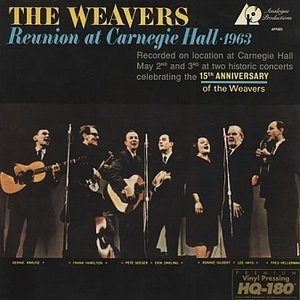
3:25 AM EDT September 1, 2024:
The Weavers - "Train Time" From the album Reunion at Carnegie Hall (1963)
Last song scrobbled from iTunes at Last.fm

2 notes
·
View notes
Text

finally finished the cover for my original story The Weavers
the human's name is Stormwell, the alv's (the green one) - Astari <3
#my art#oc#oc art#the weavers#stormwell#astari#digital art#digital artist#digital drawing#made with krita#yeah i know i last updated a year ago. ive been drawing in between that i just didnt post#i spent like a week on this#not perfect i know. but so far the best of all my art#and im trying to develop my own style! i hope you can see it
5 notes
·
View notes
Text





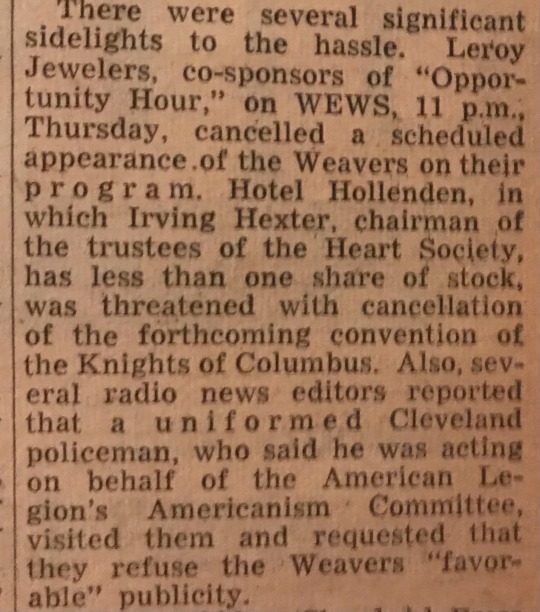
The American Legion versus the left-wing affiliations of The Weavers.
12 notes
·
View notes
Text

#alien franchise#alien#alien romulus#aliens#alien series#alien 1979#sigourney weaver#ellen ripley#ripley#alien humor#filmmaking humor#humor#comedy
26K notes
·
View notes
Text
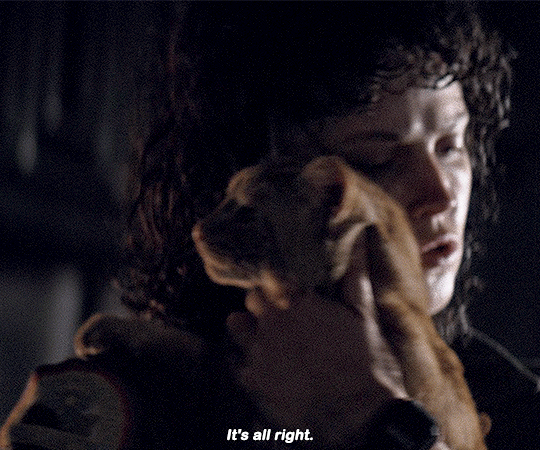

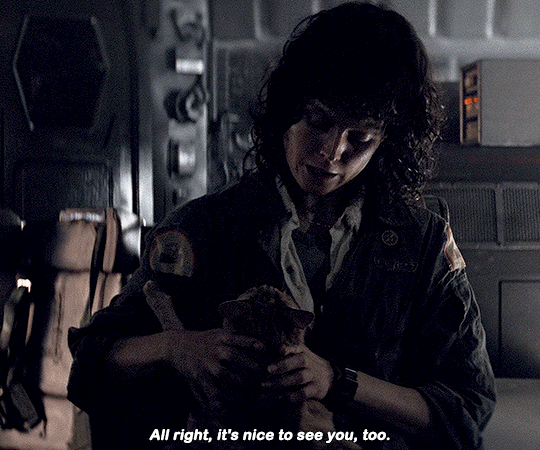
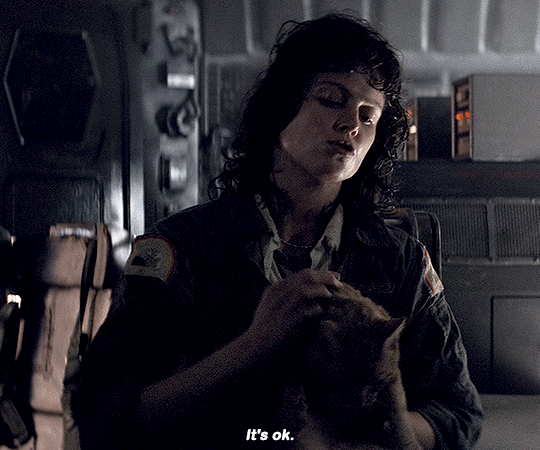
ALIEN (1979) dir. Ridley Scott
#alien#alien 1979#filmedit#alienedit#sigourney weaver#ellen ripley#horroredit#mine#gifs#10k#moviegifs#filmgifs#junkfooddaily#userstream#dailyflicks#useraurore#usersavana#usersugar#usermandie#jokerous#userrobin#userlera#scifiedit
23K notes
·
View notes
Text
Song of The Day
youtube
"If I Had a Hammer" Aretha Franklin, 1965
"If I Had a Hammer" was first written in 1949 by Lee Hays and Pete Seeger, and featured on the 1950 cover of Sing Out! magazine vol 1 iss. 1. It was written in support of the progressive party. It was first recorded by the Weavers in 1949 and was performed that same year in New York at a dinner for the communist party.

Daily Worker 1949-06-01: Vol 26 Iss 108
This performance of the song and this Newspaper would be used against Pete Seeger in his HUAC Testimony. He was sentenced to a year in prison for 'Contempt of Congress'. Here is an excerpt of the interrogation.
Mr. TAVENNER: My question was whether or not you sang at these functions of the Communist Party. You have answered it inferentially, and if I understand your answer, you are saying you did. Mr. SEEGER: Except for that answer, I decline to answer further. . . . Mr. SCHERER: Do you understand it is the feeling of the Committee that you are in contempt as a result of the position you take? Mr. SEEGER: I can’t say. Mr. SCHERER: I am telling you that that is the position of the Committee. . . . Mr. SEEGER: I decline to discuss, under compulsion, where I have sung, and who has sung my songs, and who else has sung with me, and the people I have known. I love my country very dearly, and I greatly resent this implication that some of the places that I have sung and some of the people that I have known, and some of my opinions, whether they are religious or philosophical, or I might be a vegetarian, make me any less of an American. I will tell you about my songs, but I am not interested in telling you who wrote them, and I will tell you about my songs, and I am not interested in who listened to them. . . .
Unfortunately, Pete Seeger and the rest of the weavers were blacklisted during the Red Scare, meaning that they were not able to publicly perform "If I Had A Hammer", and they were forced to disband in the early 50s.
In the Biography How Can I Keep From Singing, Pete Seeger remarks on this.
"Why was it controversial? In 1949 only ‘Commies' used words like ‘peace' and ‘freedom.'… The message was that we have got tools and we are going to succeed. This is what a lot of spirituals say. We will overcome. I have a hammer. The last verse didn't say ‘But there ain't no hammer, there ain't no bell, there ain't no song, but honey, I got you.' We could have said that! The last verse says ‘I have a hammer, I have a bell, I have a song.' Here it is. ‘It's the hammer of justice, it's the bell of freedom, the song of love."
With few exceptions, the song was dead for 12 years...
Until Peter Paul & Mary covered it in 1962
youtube
This song became a top 10 hit song in America! Since then it has been covered over 200 times. It was one of the top 100 songs of 1962 and is still a popular song today. It transcended genre and many many popular artists including Jimmie Rodgers, johnny cash, and the 'Queen of Soul', Aretha Franklin in 1965.
and, as a happy ending, the weavers performed it again in their reunion concert in 1963.
Also, a thing I like about this song is that it seems to be inspired by the John Henry song "This Old Hammer" based on the lyrics and rhythm. The hammer may have killed John Henry, but it can Hammer the way to freedom as well.
#song of the day#pete seeger#the weavers#peter paul and mary#aretha franklin#folk#folk revival#folk music#60s music#60s country#60s folk#american folk revival#american folk#red scare#mccarthyism#protest folk#struggle folk#soul music#history#american history#american socialism#if i had a hammer#music#60s#50s#Youtube
8 notes
·
View notes
Text
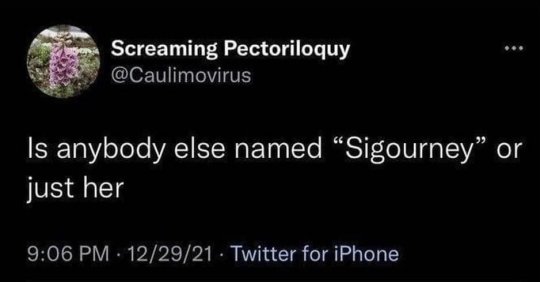
17K notes
·
View notes
Text
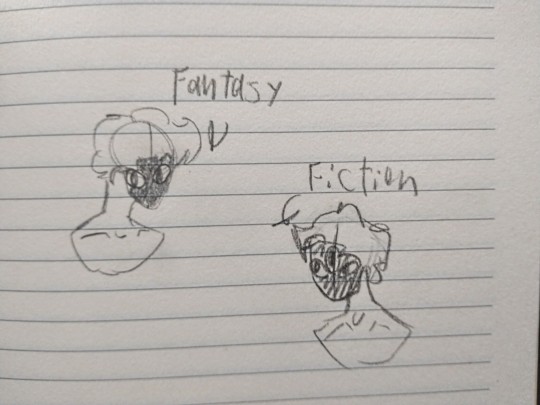
Fantasy and fiction designs, fantasy has two eyes being the middle child and fiction has three being the youngest, reality has one eye because she was and is the first, she is the oldest
7 notes
·
View notes